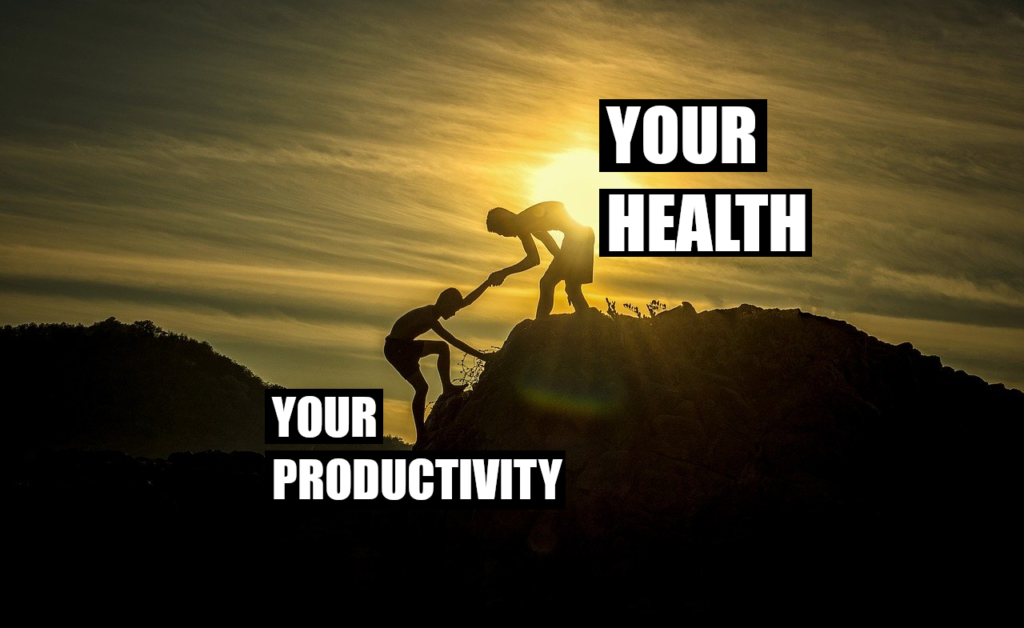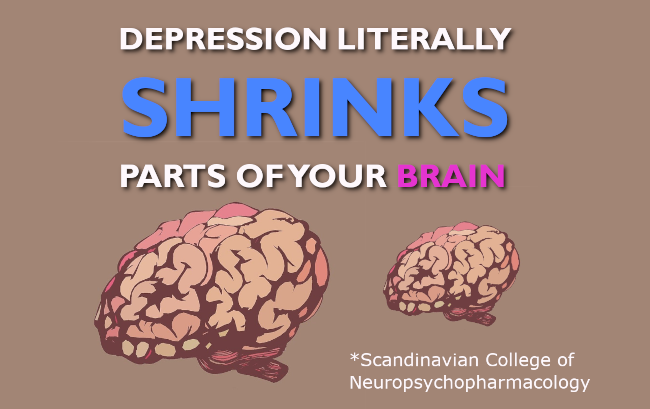Productivity increases when you realize that “productivity” isn’t a goal; it’s a side effect of being a healthy and happy person.
That means the root of the problem isn’t laziness or lack of motivation, but the certainty that we’re human beings and we run out of energy. Our bodies shut down when they’re not treated properly—as do our minds, our motivation, and our productivity.
We’re going to offer a few tips on how to prioritize your health, boost your workplace productivity—and do it all without going completely bonkers.
Stressing about productivity makes you LESS productive
If your car has a flat tire, the solution isn’t “drive more”—it’s “fix the tire” (and check the rest of your tires to assess their condition). It also means being more careful about the kind of roads you’re driving on.
Don’t flog yourself worrying about being productive; don’t try to buckle down or grit your teeth and just push through. Worrying and failing, and worrying about failing all create stress, and stress is a killer of both motivation and, you know, people.
That kind of toxic productivity is not going to help anyone, and it’s going to make things worse in the long run. And considering 25% of Americans already say work is the cause of their anxiety, we need to do everything we can to tackle this stress head-on.
Stress causes depression, and depression kills motivation. A recent study at the Karolinska Institute in Sweden found that stress is firmly linked to chronic depression and clinical anxiety.
According to the researchers’ findings, “sustained stress [. . .] is a strong environmental risk factor for developing major depression.” Would you say your job creates “sustained stress?” I’d say MOST jobs create “sustained stress,” especially when the work is important to you. This stress is especially evident when the cost of losing a job is dire—which is, again, most jobs.
Depression demolishes motivation, which turns “productivity” into a pipe dream. It’s hard to get excited about following up on a thousand emails when you barely had the energy to shower this morning.
Depression shrinks your brain. Talk about adding insult to injury. If sustained stress has you feeling the effects of major depression, the gray matter in your frontal lobe will literally decrease.
If you’re not familiar, your frontal lobe is responsible for things like memory, focus, reasoning, and executive function. No one is crushing it at work with a diminished frontal lobe.
Now that we’ve established how stress destroys the tools that allow you to be productive, let’s figure out how to manage daily stress, even on a tight schedule.
1. Short bursts of exercise make your brain work better
Don’t have a home gym or a place at your work to get your heart pumping? Don’t have the time? That’s no problem at all. You can keep a packed schedule and still make time to improve your productivity and your overall physical health.
Do some jumping jacks at your desk or go for a quick power walk around the office (or your home)—even just a few minutes will get your body and brain working better. And the science backs it up.
A study conducted by Massachusetts General Hospital found that just 12 to 15 minutes of exercise reaped significant, measurable health benefits for the subjects. The short bursts of exercise showed gains in metabolic markers for cardiovascular function and potential resistance to cardiometabolic disease.
In a press release about the study, Matthew Nayor (one of the authors of the study and a doctor of cardiology) said: “What was striking to us was the effects a brief bout of exercise can have on the circulating levels of metabolites that govern such key bodily functions as insulin resistance, oxidative stress, vascular reactivity, inflammation, and longevity.”
Sure, this means little bursts of exercise throughout your workday are going to help you live longer or whatever, but what about productivity? It turns out, exercise also helps you fight depression, thickens your cerebral cortex (which controls your attention and awareness), and may even improve memory processes.
So if you’re feeling like you’re not getting enough done or you’re struggling with a task, grab your running shoes and get that heart pumping. It could literally make you smarter.
2. Just 10 minutes of exposure to nature recharges your batteries
You don’t need a 10-mile hike through the hills to get the benefits of an outdoor break away from your responsibilities. In fact, studies show that even just minuscule exposure to nature can have positive effects on your body, energy levels, and ability to focus.
An international study by a multi-disciplinary team of Cornell researchers found that just 10 minutes in nature improved the mental health of most subjects.
They defined a “dose” of nature activity as 10 minutes, and they defined the nature activity itself as either sitting, standing, or walking in “non-exotic” nature locations. In the study, they excluded “exotic” locations like forests or mountains (what they called “deep wilderness”) and instead focused on areas “easily and routinely reached from a college campus by any student.” This would mean parks, green belts, or even just large lawns or heavily landscaped “islands” in urban or suburban areas. In the study, they even tested looking at nature, as in, through a window.
The study found that even after just 10 minutes in natural, outdoor locations, participants showed reductions in heart rate and decreases in blood pressure and the stress hormone cortisol. They also reported that they felt calmer, refreshed, and even comforted.
If you’re starting to feel agitated and unproductive, find the nearest patch of grass and sit for just 10 minutes, and you’ll get proven results. Better yet, combine this tip and the last tip, and take a quick walk through a park or near a school, or just find a nice tree to walk circles around.
Plus, it’ll just give you a break from the overload of daily information that most workers are currently struggling with.
3. Journaling helps reset your anxiety
Every therapist, English teacher, and self-help seminar will suggest you try journaling to improve your mental health. And, well, it turns out they were right. Boosting your mental wellness and productivity could be as simple as spilling your guts into the nearest Moleskine.
A study of 59 nursing students found that taking up reflective journaling increased their motivation, helped them understand their patients better, and boosted their engagement with their patients. But how is journaling so effective at reducing stress and helping productivity?
Journaling is a form of meditation. Writing your thoughts down brings you into the present, but more importantly, it forces you outside of your head. Instead of a jumbled stew of anxious thoughts, you have to organize what you’re thinking and write it down.
An upcoming, busy work week might fill us with a general feeling of stress and frustration. Another word for this is “catastrophizing,” where problems that could otherwise be safely tackled balloon into omnipotent destructive forces inside of our own minds.
However, when you write down all of your specific fears in your journal, it gives you an enemy to fight. Instead of, “Ugh, I’m going to be so busy next week,” your journal will tell you that you’re going to have four meetings, a presentation, and three reports. You’ve done meetings, you’ve done presentations, and you’ve written reports. These are problems you can solve instead of a nebulous storm of stress.
Your journal, in essence, reveals that the ghost that’s haunting you is just a guy in a sheet.
If you want to do more stuff in a quick time but don’t know exactly how you can do that yourself, I would recommend you hire productivity coaches which will surely pay off in future.
Healthy people work harder
Pamper your brain and body, and your workplace productivity will naturally improve. You’ll also be happier and healthier, which are great benefits in themselves.
Also, while we’re here and offering easy health tips: Drink plenty of water. Staying hydrated is always a good idea.



